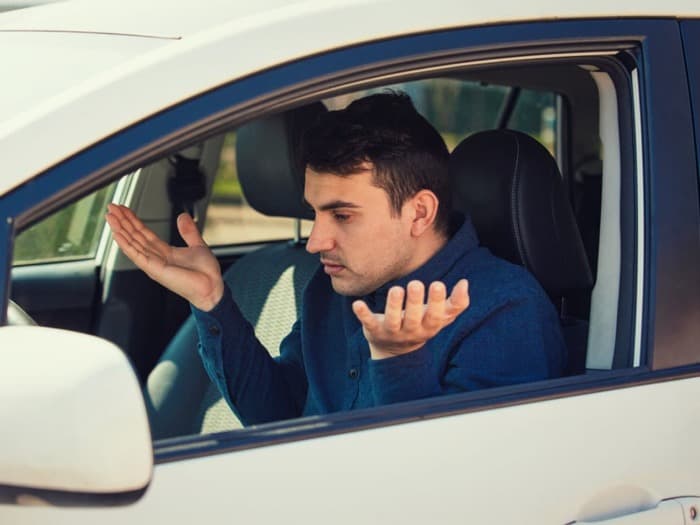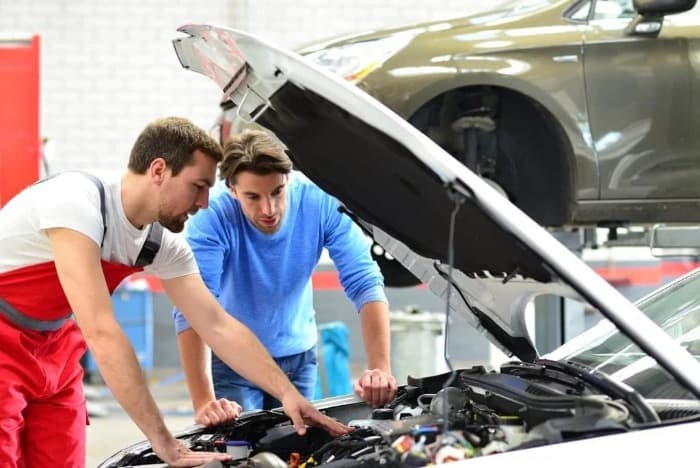Table of Contents
- Introduction to the causes of car shutting off when stopped or slowing down
- Cause #1: Faulty idle control valve
- Cause #2: Clogged fuel filter
- Cause #3: Failed fuel pump
- Cause #4: Worn spark plugs
- Cause #5: Dirty or low engine oil
- Conclusion: The Importance of Addressing a Car Shutting Off When Stopped or Slowing Down
- Frequently Asked Questions about the causes of car shutting off.
Home » Car Shutting Off When Stopped or Slowing Down -5 Causes
Introduction to the causes of car shutting off when stopped or slowing down

If you’ve been driving your car and had it suddenly shut off when you stop or slow down, you know how frustrating and potentially dangerous it can be. Whether you’re trying to make it through a busy intersection or simply coming to a stop at a red light, having your car shut off without warning can be a nerve-wracking experience.
There are several potential causes for a car shutting off when stopped or slowing down, and identifying the root cause is key to finding a solution. In this article, we’ll explore five common causes of this issue and provide tips on troubleshooting and fixing it.
We’ll also examine the role of dirty or low-engine oil in this issue. Properly lubricated engines run more smoothly and are less likely to shut off unexpectedly, so it’s important to keep an eye on your engine oil level and ensure it’s clean and proper.
By understanding these common causes and their symptoms, you’ll have a better knowledge to diagnose and fix a car that shuts off. Please keep reading to learn more about these issues and how to address them.
Cause #1: Faulty idle control valve
A faulty idle control valve is one potential cause of a car shut off when stopped or slowed down. This valve is located in the engine’s throttle body and is responsible for regulating the amount of air flowing into the engine when the car is idling.
If the idle control valve is not working properly, it can cause the engine to stall when the car comes to a stop or slows down. This can be particularly frustrating if it happens at a stoplight or other busy intersection.
Symptoms of a faulty idle control valve may include the car stalling at stoplights or experiencing rough idle. You may also notice that the engine revs up or down unexpectedly when the car is idling.
To diagnose a faulty idle control valve, a mechanic will typically connect a diagnostic tool to the car’s computer system and run a series of tests to check the valve’s operation. If the valve is not functioning correctly, it will need to have a replacement.
If you’re experiencing issues with your car shutting off when stopped or slowed down and you suspect a faulty idle control valve may be to blame, it’s essential to get it checked out by a mechanic as soon as possible. Ignoring this issue can lead to further damage to the engine and potentially costly repairs down the road.
Cause #2: Clogged fuel filter
Another potential cause of a car shutting off when stopped or slowed down is a clogged fuel filter. The fuel filter is a crucial component that helps to remove impurities from the fuel before it reaches the engine.
If the fuel filter becomes clogged, it can prevent the proper amount of fuel from reaching the engine, causing the car to shut off when stopped or slowed down. This can be particularly problematic if you’re driving on the highway or in other high-speed situations where the engine needs a steady supply of fuel to run smoothly.
Symptoms of a clogged fuel filter may include reduced fuel efficiency, difficulty starting the car, and a loss of power while driving. If you notice any of these issues, it’s vital to get the fuel filter get check by a mechanic.
To diagnose a clogged fuel filter, a mechanic will typically connect a diagnostic tool to the car’s computer system and run a series of tests to check the fuel system. If the fuel filter is clogged, it will need a replacement.
In addition to causing problems with the car shutting off when stopped or slowed down, a clogged fuel filter can also lead to other issues with the fuel system and engine. Therefore, it’s essential to address this issue promptly to avoid further damage.
Cause #3: Failed fuel pump
Another potential cause of a car shutting off when stopped or slowed down is a failed fuel pump. The fuel pump is responsible for pumping fuel from the fuel tank to the engine, and if it’s not functioning correctly, the engine may not receive enough fuel to keep running.
Symptoms of a failed fuel pump may include the car sputtering or experiencing a loss of power, especially when driving at high speeds. You may also notice that the vehicle has difficulty starting or that the fuel gauge reads incorrectly.
To diagnose a failed fuel pump, a mechanic will typically connect a diagnostic tool to the car’s computer system and run a series of tests to check the fuel system. They may also visually inspect the fuel pump and listen for any unusual noises.
If the fuel pump is faulty, it will need a replacement. It can be a costly repair, so it’s important to address this issue promptly to avoid further damage to the engine.
In addition to causing problems with the car shutting off when stopped or slowed down, a failed fuel pump can also lead to other issues with the fuel system and engine. Therefore, it’s essential to have your mechanic check the pump if you’re experiencing any of the symptoms described above.
Cause #4: Worn spark plugs
Another common cause of a car shutting off when stopped or slowed down is worn spark plugs. Spark plugs are small but crucial components that help ignite the fuel in the engine, and if they’re not in good condition, they may need help to do their job effectively.
Symptoms of worn spark plugs may include reduced fuel efficiency, a misfiring engine, and difficulty starting the car. You may also notice that the car is slower to accelerate or experiences a loss of power while driving.
To diagnose worn spark plugs, a mechanic will typically connect a diagnostic tool to the car’s computer system and run a series of tests to check the ignition system. They may also visually inspect the spark plugs and look for any signs of wear or damage.If the spark plugs are faulty, you have to replace it.
In addition to causing problems with the car shutting off when stopped or slowed down, worn spark plugs can also lead to other issues with the ignition system and engine. Therefore, it’s important to get them checked out by a mechanic if you’re experiencing any of the symptoms described above.
Cause #5: Dirty or low engine oil
Another potential cause of a car shutting off when stopped or slowed down is dirty or low engine oil. Properly lubricated engines run more smoothly and are less likely to shut off unexpectedly, so it’s important to keep an eye on your engine oil level and make sure it’s clean and at the proper level.
Symptoms of dirty or low engine oil may include the check engine light coming on, the engine making unusual noises, and reduced fuel efficiency. You may also notice that the car is slower to accelerate or that it experiences a loss of power while driving.
To diagnose dirty or low engine oil, a mechanic will typically connect a diagnostic tool to the car’s computer system and run a series of tests to check the oil level and condition. They may also visually inspect the engine and look for any signs of oil leaks or other issues.
If the engine oil is found to be dirty or low, it will need to be replaced or topped off as needed. This is a relatively straightforward repair that you can do relatively quickly.
In addition to causing problems with the car shutting off when stopped or slowed down, dirty or low engine oil can also lead to other issues with the engine. Therefore, it’s important to regularly check your oil level and change it according to the manufacturer’s recommended schedule to keep your engine running smoothly.
Conclusion: The Importance of Addressing a Car Shutting Off When Stopped or Slowing Down
In this article, we’ve explored five common causes of a car shutting off when stopped or slowed down: a faulty idle control valve, a clogged fuel filter, a failed fuel pump, worn spark plugs, and dirty or low engine oil. These issues can prevent the proper fuel or air from reaching the engine, causing it to shut off unexpectedly.
If you’re experiencing this issue with your car, it’s important to address it promptly to avoid further damage to the engine and costly repairs down the road. By understanding the symptoms and causes of these issues, you’ll be better equipped to diagnose and fix your car if it shuts off when stopped or slowed down.
If you need clarification on what’s causing the issue with your car, it’s always a good idea to consult a mechanic. They have the tools and expertise to diagnose and fix the problem and can get you back on the road safely and efficiently.
Overall, the key to preventing problems with a car shutting off when stopped or slowed down is to stay on top of regular maintenance and address any issues as soon as they arise. By doing so, you’ll be able to keep your car running smoothly and avoid frustrating and potentially dangerous situations on the road.
Frequently Asked Questions about the causes of car shutting off.
What causes a car to shut off when stopped or slowing down?
Several potential causes of a car shut off when stopped or slowing down include a faulty idle control valve, a clogged fuel filter, a failed fuel pump, worn spark plugs, and dirty or low engine oil.
How can I tell if my car is shutting off due to one of these issues?
Some common symptoms of these issues may include the car stalling at stoplights, reduced fuel efficiency, difficulty starting the car, a misfiring engine, the check engine light coming on, and the machine making unusual noises.
Can I fix these issues independently, or do I need to take my car to a mechanic?
Some of these issues may be relatively straightforward, such as checking and replacing dirty or low engine oil. However, other issues, such as a faulty idle control valve or a failed fuel pump, may require the expertise and tools of a mechanic.
Is it dangerous to drive a car that shuts off when stopped or slowing down?
It can be dangerous to drive a car that shuts off when stopped or slowing down, particularly if it happens in a busy intersection or at high speeds. If you’re experiencing this issue with your car, it’s important to address it promptly.
How can I prevent issues with my car shutting off when stopped or slowing down in the future?
It’s crucial to stay on top of regular maintenance and address any problems as soon as they arise to prevent issues with your car shutting off when stopped or slowing down in the future. This includes checking and replacing dirty or low engine oil, replacing worn spark plugs, and regularly checking your fuel filter and fuel pump.


